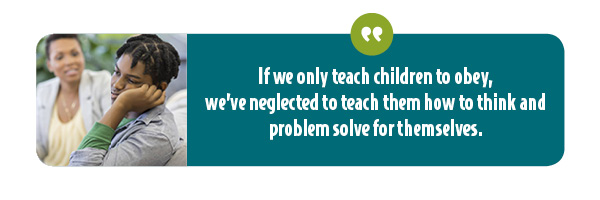Whether you're dealing with toddler tantrums, a middle-schooler's meltdown, or the emotional darts of a teen, one thing is clear: it is up to adults to be stable figures for children to build emotional intelligence. But what are the essential ingredients to ensure that you cultivate emotional development and social intelligence?
Many parents I talk to have the mistaken idea that they must be perfect parents to be good parents. The opposite is true.
Estimated reading time: 4 minutes

Permission for Parents to be Imperfect
If you're like most parents with a teen, you're probably saying, "What if he follows me and doesn't leave me alone?" Yes, this is possible, and it still doesn't negate the need for you to calm yourself. If you allow him to engage you at this point, it's likely that it won't be pretty. Simply smile and repeat your boundary. It takes practice, but it's worth it! Far better to model self-calming that to react and regret your behavior later.

Parenting Tip: Model the Behavior You Want
If you're asking how to teach children emotional fitness, you're interested in providing the kind of parenting that instills self-control and emotional intelligence. Your desire is already commendable. And there is only one good answer: The best way is to model the behavior you want!
How a parent responds matters. Most of what children and teens learn about emotional intelligence and what comprises their "emotional workout" is made up of their interactions with their caregivers.
Through the responses of the adults around them, especially their parents, children learn emotional regulation and how to interact appropriately within the world.
When we set appropriate limits, set healthy boundaries, and stay true to our own feelings or needs while also communicating clearly to our children, they begin to download this same wisdom.
Teaching children and teens how to express their emotions appropriately is no different than teaching them how to shoot a rifle. The process takes deliberate intention, focus, and skill. And one of the greatest gifts you can give your children is the stability of a happy home. So take care of yourself and remember that self-care is a foundation for all loving parental responses.

Ways to Model as a Parent So Your Children and Teens Develop Emotional Intelligence
Below are three key things you can practice to ensure a higher emotional EQ in your children, no matter their age.
Mirror feelings for children and teens effectively.
Children and teens need an accurate mirror from which to build emotional intelligence. (We actually have mirror neurons in our brains for this very reason!) The more accurately we can reflect back for them, the more easily they can identify, understand, and own their emotions and follow through with productive action. This healthy model and exchange teach them appropriate ways to manage their feelings.
Allow free expression of feelings.
Emotions are energy moving through us. Every feeling has an important purpose in helping us live authentic and happy lives. If we shame an emotional outburst, that emotion will not find compassionate acceptance in the child as they grow up. If we set firm and kind limits for emotion without shame, they will learn how to bridle their emotions productively.
One of the best ways to help a child understand their emotions is to show empathy, especially when they're feeling BIG emotions. Empathy helps to soothe and calm feelings while it also communicates to the child that their emotions are accepted and are purposefully guiding them.
Related reading: "How to Build Healthy Emotional Development in Children"
If you can't respond to your child or teen lovingly because you're
too upset, then model self-calming.
We're all human, and there are times when patience runs thin. Our modeling then becomes teaching our children that it's okay to be human as long as we take responsibility for our emotions.
Self-regulation as a parent also demonstrates how to manage emotions without lashing out at others. When children learn how to listen to and manage their emotions, confidence increases and their composure promotes better relations with their family, teachers, friends, and peers.
 We are not powerless in the midst of an emotional hurricane, whether it's a five-year-old's refusal to cooperate or the gale of a teen. Sometimes it's vital to self-calm, at times it's critical to set a boundary and require respect, and other times we can diffuse a tense interaction by shifting to fun-loving behavior and doing the unexpected to diffuse the intensity quickly.
We are not powerless in the midst of an emotional hurricane, whether it's a five-year-old's refusal to cooperate or the gale of a teen. Sometimes it's vital to self-calm, at times it's critical to set a boundary and require respect, and other times we can diffuse a tense interaction by shifting to fun-loving behavior and doing the unexpected to diffuse the intensity quickly.
But most importantly, consistently provide a solid, accurate mirror to help children gain emotional intelligence and your job will get easier and easier as they grow in self-control, emotional fitness, and maturity.
If you'd like personalized support or parenting coaching, contact us at support@heartmanity.com. We love empowering parents and families!
For a step-by-step method to learn how to be a calm, neutral mirror, see "How to Be an Accurate Mirror for Others' Emotions."








